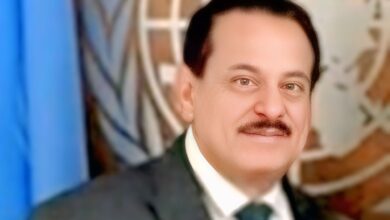Professor Hamid

Yemeni mp
Ahmed Saif Hashed
Professor Hamid teaches us the subject of State Theory and Law, which is considered one of the most important courses in the first year of law studies, occupying a significant portion of our class schedule. He is characterized by his firmness, seriousness, and deep understanding of the subject, but even more so by his extreme reluctance to award grades to his students. While the course lectures are conducted by a Russian professor, Professor Hamid primarily translates and handles all aspects of teaching the course from A to Z, aside from preparing the lectures and some formal attendance by the lecturer. As a result, Professor Hamid commands respect and imposes his presence on everyone.
The first real test in this subject was shocking in its results for all. It was the first subject to be tested in our cohort, with results announced in the grand hall. That day is one we will always remember, as the announcement provided an initial glimpse into each student’s academic level. Perhaps this was our first genuine acquaintance with each other in terms of our ability to excel and a test of our capacity to engage with university studies. The highest score achieved was seven out of ten, attained by only a few of us—no more than four or five students. We became the center of astonishment and inquiry from our peers about how we managed to achieve such results in the face of stringent grading. To our colleagues, we seemed like miracle workers amidst a significant and resounding disappointment that engulfed the majority of our cohort. We were akin to survivors of a shipwreck.
I do not recall any female student receiving a score of seven out of ten, unless my memory fails me. The highest score among the girls was five. Most female students performed poorly, primarily due to memorizing the material from the notebook without referring back to the sources. Nevertheless, a score of five appeared commendable compared to those below it, a mark achieved by only a few. As for the seven, it signified distinction and drew the attention of others.
The score of zero out of ten echoed repeatedly, along with ones and twos. Hearing a zero reverberated in the hall, striking its bearers like a thunderclap. Meanwhile, the ones and twos landed on their holders like artillery shells. The disappointment was profound, the results shocking, and the faces of those who received their scores turned crimson with embarrassment. Those who received five or even four would quietly say to themselves, “O Lord, thanks and gratitude to You.”
Professor Hamid’s message to the students through these results was clear: read beyond the notebook. The lessons in the notebook are merely titles. Only those who read the references and provided thorough answers were awarded the seven points. Everyone felt that university was something different, and this test was the first and most significant one we encountered, revealing the true value of the university and what higher education really means.
We have shared several amusing moments with this esteemed professor. In one of the discussion seminars, my friend and colleague, Qaid Hassan Hizam, would take the floor to answer Professor Hamid’s questions. He would elaborate extensively, beginning from the very start and taking what felt like a thousand miles to eventually arrive at the answer only after much effort and time. He seemed disinclined to give a direct response, preferring instead to start from the origins, reaching the desired conclusion only after a long and arduous journey.
On one occasion, Professor Hamid asked our colleague about the communist phase. Our colleague began to respond by tracing back through the stages of human history, discussing slavery, feudalism, capitalism, and socialism before finally reaching communism. This would be a lengthy process, stretching beyond our allotted time, and if he rushed, he might only reach the desired topic by the end of the day. To our surprise, Professor Hamid asked for permission to leave the room and go to Sheikh Othman, telling us to call him when our colleague reached the communist phase so he could return to complete the seminar. At that moment, we nearly burst into laughter.
Whenever Professor Hamid directed a question to Qaid, we all waited with bated breath for his answer, holding our laughter in our chests to avoid bursting out, recalling the previous incident when Professor Hamid almost left for Sheikh Othman. Still, my friend Qaid remains one of my dearest and kindest friends, a person of integrity and trust. He struggled significantly to complete his university studies due to difficult financial circumstances. He had a wife, children, and responsibilities, while his simple father bore all the burdens until Qaid finished his studies and eventually became a judge.
* * *






